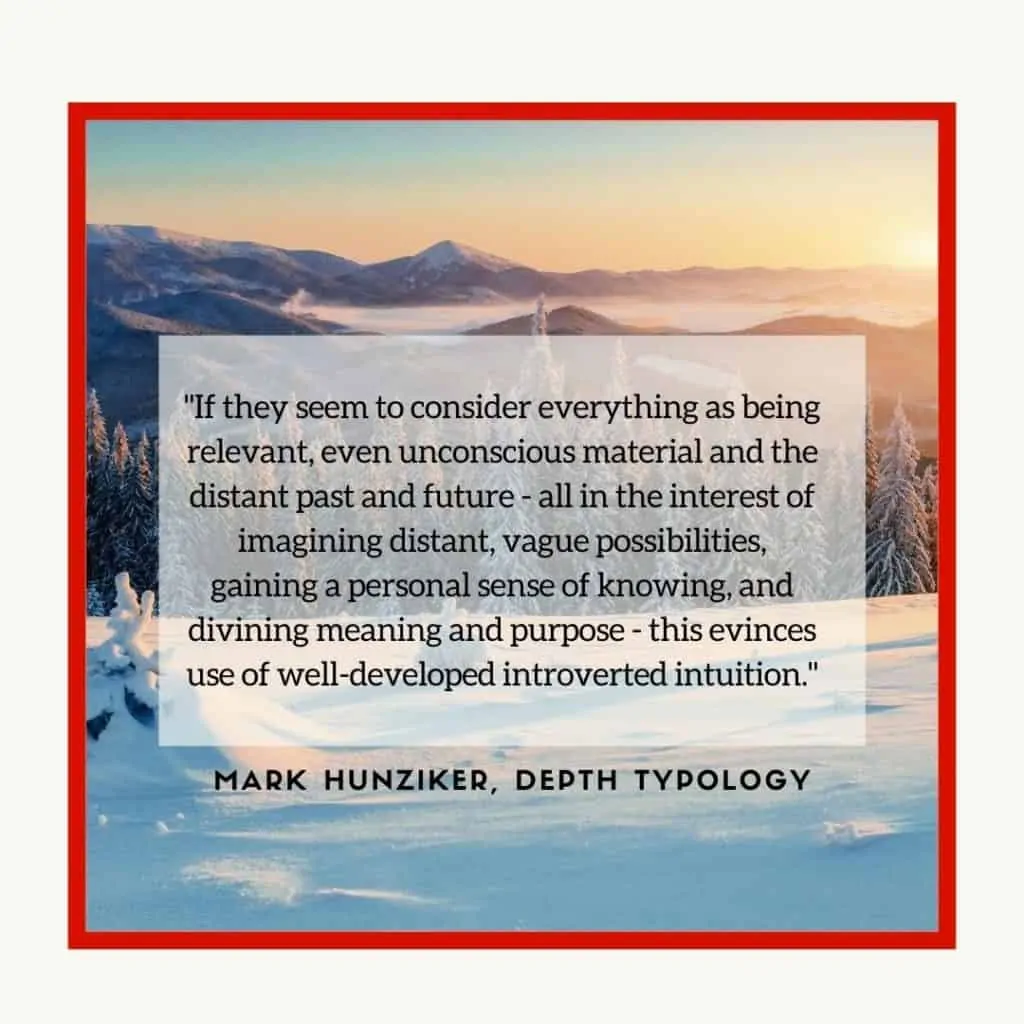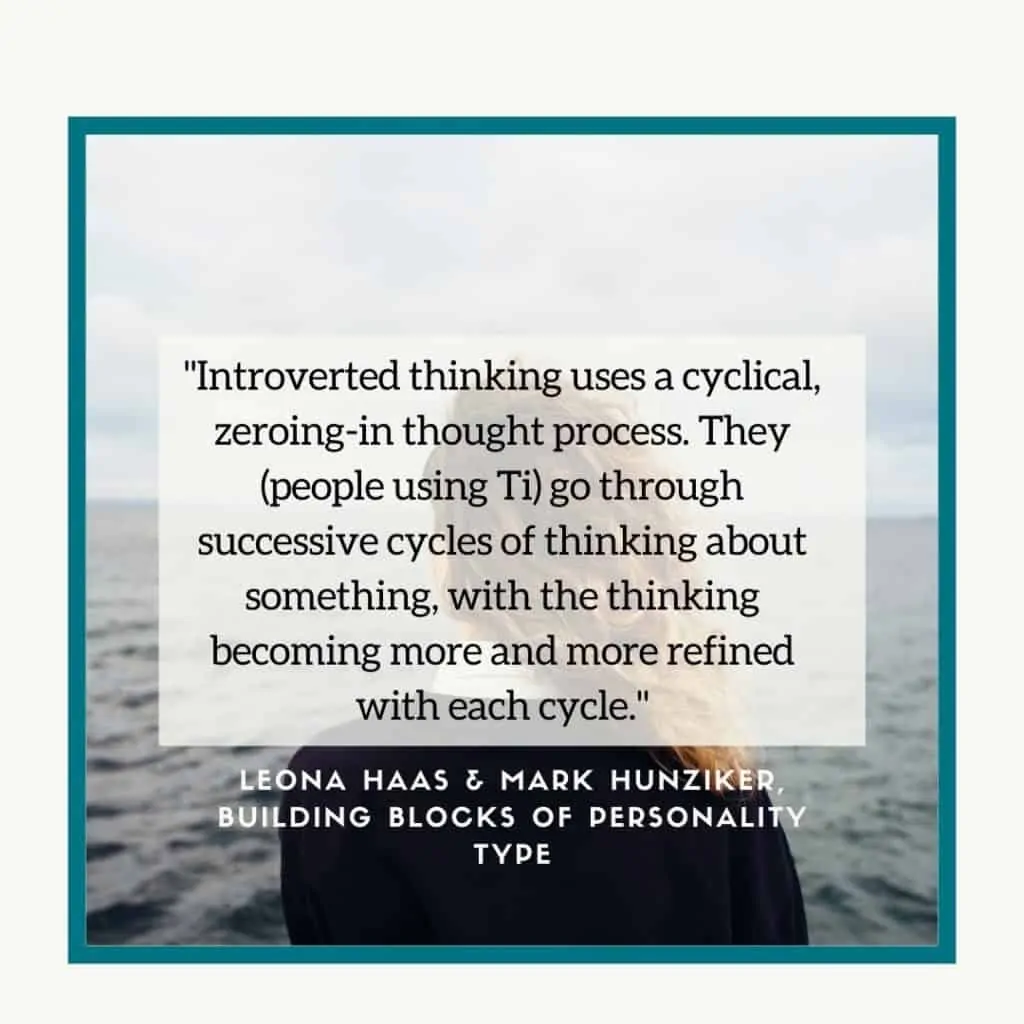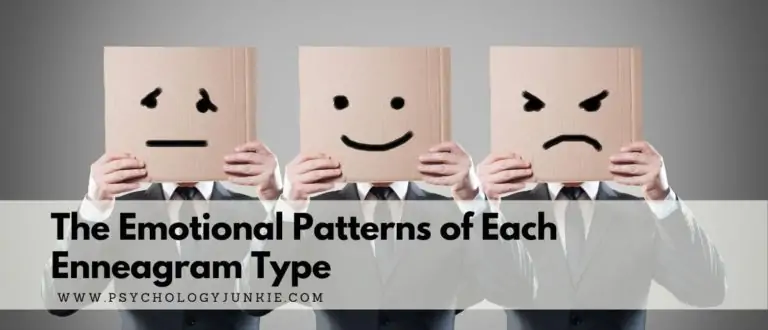The INFJ’s Cognitive Functions
Have you ever heard someone mention the INFJ’s cognitive functions? Maybe you’re new to type and the term “cognitive functions” fills you with confusion. Maybe you’ve been studying type for years but you still don’t feel like you have a handle on it.
Today we’re exploring how the INFJ mind works. One of the ways we describe that is by looking at what typologists call “cognitive functions.” While it might sound complicated, it’s really just another way of saying “mental processes.”

If you’ve taken the Myers-Briggs® personality test you might think that the MBTI® is just a collection of dichotomies. Introvert vs Extrovert, Intuitive vs Sensor, Thinker vs Feeler, or Judger vs Perceiver. But there’s a whole deeper level of understanding that provides the framework for each personality type in this system. Each personality type has access to eight cognitive functions. However, the way they use those functions will vary from type to type. Today we’re going to explore the eight cognitive functions of the INFJ and how those will show up in day-to-day life.
Not sure what your personality type is? Take our new personality questionnaire here. Or you can take the official MBTI® here.
Table of contents
- The INFJ’s Cognitive Functions
- Part 1 – The Ego-Syntonic Functions
- Dominant Function – Introverted Intuition (Ni)
- Auxiliary Function – Extraverted Feeling (Fe)
- Tertiary Function – Introverted Thinking (Ti)
- Inferior Function – Extraverted Sensation (Se)
- The Shadow Functions of the INFJ Personality Type:
- Opposing Role – Extraverted Intuition (Ne)
- Critical Parent – Introverted Feeling (Fi)
- Trickster – Extraverted Thinking (Te)
- Demon – Introverted Sensation (Si)
Estimated reading time: 13 minutes
The INFJ’s Cognitive Functions
Part 1 – The Ego-Syntonic Functions
“The dominant, auxiliary, tertiary, and inferior functions are “ego-syntonic,”…they are congruous with each other, and therefore, with one’s sense of “who I am.” They may contradict and battle with each other at times, but they are still on the same team. They fit together like pieces of a puzzle, complementing each other in many ways. And although there is a level of dynamic tension between them, it is not a tension that threatens to negate our sense of ego-selfhood – that calls into question the very legitimacy of our notion of “who I am.” A dominant introverted intuitive, for example, may struggle with her inferior extraverted sensing. But it is possible to make peace between them. We can reach a level of cooperation between these parts of ourselves, without undermining our sense of identity.” – Mark Hunziker, Depth Typology
Dominant Function – Introverted Intuition (Ni)

Introverted Intuition is the strongest and most accessible function of the INFJ. This is what comes most naturally with the least amount of energy for INFJs. Ever wondered how INFJs get such uncanny insights into what’s going on with people? You can thank Introverted Intuition for that.
Introverted Intuition, or “Ni” is all about gathering information, finding patterns, and looking for far-reaching implications. It’s kind of like having a detective in your mind, looking for clues, anticipating outcomes, and seeing things that others don’t. It’s the part of the INFJ that gets the “twist” ending in a movie before anyone else does.
What Does Introverted Intuition Do?
- Searches for a deeper layer of meaning
- Looks for hidden patterns and trends
- Foresees implications and likely results
- Is the foundation of strategic thinking
- Sees things from many different perspectives
- Reads between-the-lines
- Looks for the unseen ripple-effects of current experiences and actions
- Looks for symbolism and significance beneath reality
Auxiliary Function – Extraverted Feeling (Fe)

This is the co-pilot or “second in command” of the INFJ psyche. Extraverted Feeling is what INFJs use when they have to interact with the outside world. It’s also a decision-making function. This means when INFJs decide what to do about something they’ll look outside themselves. They’ll ask themselves, “What does everyone around me need?” “How is everyone feeling?” “What will support the well-being of the group?”
INFJs may also crowdsource opinions when they have to make a major decision. Fe looks outward for objective judgment, which is why INFJs might gather many different perspectives and opinions before they decide what to do regarding an important life decision.
What Does Extraverted Feeling Do
- Considers the emotional and physical needs of the people around one’s self
- Tunes into the emotional wavelengths of others
- Tries to create a harmonious atmosphere
- Considers the feelings and perspectives of other people when making a decision
- Lives by a code of conduct about what “should” and “should not” be done
Tertiary Function – Introverted Thinking (Ti)

Introverted Thinking is the “Eternal Child” of the INFJs cognitive functions. This function is what INFJs tap into when they’re feeling playful, creative, or relaxed. This function also helps to support the rest of the psyche. Introverted Thinking focuses on creating a mental map of how things work. It wants to know how everything connects and discover logical relationships. It is concerned with accuracy, logical perfection, and mental clarity. Because this function is tertiary for INFJs, it isn’t as powerful as Ni or Fe.
How tertiary Introverted Thinking Shows Up for INFJs:
- A desire for concise or very specific words to describe things as accurately as possible
- A focus on making decisions that are sensible and not just guided by emotions
- A tendency to internally nitpick the logic of various arguments
- An interest in the background mechanisms behind things (for example, learning how various objects are made or various philosophies intersect)
- A strong dislike for logical fallacies
Inferior Function – Extraverted Sensation (Se)

Extraverted Sensation is the Achilles’ heel of the INFJ. This function continually trips up INFJs and can make them feel disoriented and out of their element. While they find it impressive in others, it can often feel impossible to master in their own lives.
Se is focused on gathering immediate concrete data from the world around one’s self as well as responding quickly to stimuli and incoming tasks (like a phone ringing or a ball coming your way). People who have high-functioning Se (ESPs and ISPs) usually have a fluid, graceful way of interacting with the world around them. They are also in tune with details and can recall factual observations in accurate detail. INFJs, in contrast, often struggle to keep up with details and can find highly stimulating environments overwhelming and stressful.
How inferior Extraverted Sensing Shows Up for INFJs:
- Inattentiveness to concrete details in the environment
- Sensitivity to a lot of sensory commotion in the outer environment
- Lag when responding to sudden changes in the environment
- Tendency to bump into, or trip over, things in the environment
- During cases of grip stress, Se may influence INFJs to be hyper-impulsive, indulgent, and sensory-seeking
- As the INFJ matures, Se gives them a grounding in the present moment
- As the INFJ matures, Se gives INFJs more factual basis for their predictions and insights
The Shadow Functions of the INFJ Personality Type:
Shadow functions are the less conscious sides of our personality type. They can be experienced in positive or negative ways, but they’re far less mature than our “ego-syntonic” functions (dominant, auxiliary, tertiary, inferior). We often don’t associate them with ourselves and we risk making projections about people who use these functions without realizing it. At the same time, these functions can help us in situations when we are being attacked (fairly or unfairly) and they can keep our primary functions from becoming inflated and out of control.
“Shadow functions “fight dirty” to defend the personality.” – John Beebe
“Development of the ego-dystonic function attitues is usually more a matter of accepting their limitations and their primitive, archetypal nature and cultivating our ability to roughly translate their messages while we struggle to use the associated practical skills that would naturally become well-honed if those function-attitudes were truly developed.” – Mark Hunziker, Depth Typology
Opposing Role – Extraverted Intuition (Ne)
The oppositional role helps to keep the dominant function from getting inflated. This is the leader of the “shadow functions,” and therefore doesn’t feel like part of the INFJ. It feels like a foreign entity that INFJs don’t relate to or recognize in themselves. It also is a function that can cause INFJs to make projections towards other people. The shadow functions in many ways are areas of our personality that are obvious to the outside world but we don’t see in ourselves.
Extraverted Intuition is focused on exploring possibilities, making random connections, and generating alternatives. High-Ne users (ENPs and INPs) can instantly see random connections and possibilities all around them. They enjoy generating more possibilities and feel increasingly bored if they have to narrow them all down or focus on only one for an extended period of time. Because Ne is in the oppositional role, INFJs can experience it as a distracting, passive-aggressive voice in the back of their mind.
How oppositional Extraverted Intuition can show up in INFJs:
- INFJs may experience Ne as a distracting voice to their Ni aims. As they focus on one singular insight, Ne may distract them with alternatives and possibilities and appear “oppositional.”
- INFJs may dismiss people who seem narrow-minded or stuck in their ways.
- Ne may be experienced as a voice inside the INFJ’s mind that reminds them of different possibilities and ideas besides the one they are currently focusing on.
- INFJs may regularly sense bizarre possibilities that play before their mind’s eye. For example, they might regularly imagine themselves driving into other vehicles as they are behind the wheel, or they might imagine themselves doing embarrassing things at work. They won’t typically act on these imaginings, but they are regularly bothered by them.
- As INFJs mature and grow, they balance their Ni insights and predictions with data from Ne. They are able to present multiple options and explore alternatives to their core visions.
Critical Parent – Introverted Feeling (Fi)
The critical parent can be positive or negative. In general, INFJs are more comfortable in the world of Extraverted Feeling (Fe). They have a skill at navigating the emotional atmosphere and responding in the moment to emotional nuances and needs.
Unlike Fe, Fi is focused on one’s own individual values, desires, and emotions. Fi is concerned with living authentically according to a very personal code of ethics. Fi also sorts out individual emotions privately without a lot of need for feedback from others.
To the INFJ, Fi is often experienced as a critical, belittling voice in the back of the INFJ’s mind. It might criticize their choices, values, and decisions, berating them for past mistakes or berating others for moral failures. Fi often feels belittling or limiting to INFJs. But there are moments where Fi helps INFJs to balance their emotional awareness with an in-depth awareness of their own values and personal needs. Fi can help INFJs not to be run over by Fe, which can happen when INFJs overextend themselves for other people.
How critical Introverted Feeling can show up in INFJs:
- INFJs may feel inwardly critical towards people whose choices don’t align with their personal values (for example, if they’re vegan they might think critically towards people who eat meat. They often don’t show these judgments on the outside)
- INFJs may berate and scold themselves repeatedly for moral failings in their past
- INFJs may feel that they can’t do or be something because of a moral failing in their past
- INFJs may replay past mistakes in their mind, thereby limiting their capacity to move forward
- INFJs may project critical Fi onto Fi-users, feeling that they are being criticized or belittled by them when they’re not
- INFJs may try to hold themselves to a very strict code of conduct and chastise themselves severely when they fail
Trickster – Extraverted Thinking (Te)
The trickster is a function that comes into play as a defender of the psyche. Trickster Te can show up as a mischievous voice, getting people trapped in double binds or dismantling their agendas and rules.
Extraverted Thinking is the ability to organize and structure the world around one’s self for maximum efficiency. It considers empirical logic and looks for standards and operating procedures that keep life running smoothly and effectively. Te-users (TJ types) are skilled at delegating, organizing, and managing resources.
How trickster Extraverted Thinking can show up in INFJs:
- INFJs may experience TJ personality types as “bossy,” controlling, or full of themselves. They may tease TJs or inwardly mock them when they feel that they’re taking charge or being too directive.
- INFJs may perform tasks inefficiently out of habit and feel amused and annoyed when people try to correct them. For example, they may put all their most-used dishes in the furthest cabinet from where they cook in the kitchen. When confronted with this reality, they may just smirk, cross their arms, and feel like the other person is being condescending.
- May use if/then logic that doesn’t make sense or is unrealistic. For example, they might throw coins into a wishing well before going to work in hopes that it will ensure a good day.
- When INFJs feel attacked or confronted by other people, they may trick them or use deceptive reasoning to evade conflict.
- As INFJs grow and mature they may use Te in positive ways. They develop a more efficient way of managing their tasks and goals. They can also develop stronger connections with TJ personality types and feel less belittled or controlled by them.
Demon – Introverted Sensation (Si)
The demon is the most repressed and foreign part of the personality. In the case of INFJs, this role is filled by Introverted Sensation (Si). Introverted Sensation focuses on comparing and contrasting past experiences with what is happening in the present. Si relays impressions from the past, pays attention to concrete details, looks to tried-and-true methods for solving problems, and prioritizes routine, comfort, and physical well-being.
Because Si is in the demon position for INFJs, they tend to feel debilitated by it many times. It often seems like a source of great shame and also great power. At times, INFJs may use Si in dark, underhanded ways, demonizing themselves or others.
How demon Introverted Sensation can show up in INFJs:
- During intense stress or conflict, INFJs may bring up a laundry list of embarrassing failures and mistakes from someone’s past.
- INFJs may habitually replay negative memories from the past over and over again.
- INFJs may consistently de-prioritize their own comfort, health, and physical well-being.
- INFJs may feel like a routine is stifling or “traps” them.
- INFJs may find people who value Si (SJs) to be “stuck in their ways” or overly reliant on “useless” conventions and traditions.
- INFJs may struggle to trust past experiences and concrete information.
- At times, Si may unexpectedly help the INFJ, saving them from harm, by reminding them of useful information from their past.
- In conflict situations, when the INFJ feels at risk of damage to their psyche, Si may provide them with a startling fact or series of past mistakes that will completely dismantle their opponent’s argument.
Wrapping It All Up (What Are the INFJ’s Cognitive Functions Really?)
All of the cognitive functions can show up in a multitude of different ways. This article gives only a handful of the ways the functions can be used. But keep in mind there is a general “flavor” for the positions in your stack:
- The dominant function feels heroic, trusted, enlightening, natural, and in control.
- The auxiliary function feels supportive, warm, comforting, and dependable.
- The tertiary function feels fascinating, creative, vulnerable, and undependable.
- The inferior function feels aspirational, mysterious, out of reach, and both intriguing and unimportant at the same time.
- The oppositional role feels distracting, offensive, seductive, self-sabotaging.
- The critical parent feels belittling, dismissive, controlling, scolding.
- The trickster feels mischievous, playful, underhanded, immoral, clever, silly.
- The demon function feels undermining, unexpected, dark, destructive.
Also, keep in mind that even the shadow functions can show up in positive ways. The shadow is essential in keeping your psyche balanced. Without the shadow functions, our primary functions would be one-sided, inflated, and overbearing. Shadow functions provide a much-needed alternate perspective, even if they don’t always present it in the best way. They can also undermine us by pointing out mistakes, sabotaging relationships, and inactivating our greater abilities. The important thing is to be aware of these functions and notice when you’re using them in a negative way or projecting them onto others.
“Doing our best to experience and practice using our undeveloped function-attitudes has many important benefits: It gives us some sense of each function-attitude, which in turn engenders respect for its contributions and for those who use it well. It gives us a greater appreciation of our own incompetence and ignorance in these areas, which leads to a healthy humility. It encourages us to develop conscious compensation tactics, such as enlisting the aid of someone with different typological gifts. It helps us deal a little better with what life throws at us.” – Mark Hunziker, Depth Typology
Sources:
Understanding Yourself and Others® An Introduction to the Personality Type Code by Linda V. Berens and Dario Nardi (InterStrength, 2004)
Building Blocks of Personality Type by Leona Haas and Mark Hunziker (Eltanin Publishing, 2014)
Depth Typology: The Guide Map To Becoming Who We Are by Mark Hunziker (Write Way Publishing, 2016)
Energies and Patterns in Psychological Types by John Beebe (Routledge; 1st edition (June 22, 2016)
Other Articles You Might Enjoy:
7 Things That INFJs Experience as Children
To the INFJ Who is Struggling to Find Friends
24 Signs That You’re an INFJ, the “Mystic” Personality Type
What Are Your Thoughts?
Do you have any insights or experiences to share? Let us know in the comments!
Find out more about your personality type in our eBooks, The INTJ – Understanding the Strategist, Discovering You: Unlocking the Power of Personality Type, The INFJ – Understanding the Mystic, and The INFP – Understanding the Dreamer. You can also connect with me via Facebook, Instagram, or Twitter!










It’s sad to want impose weaknesses with as much precision, on people you don’t know, the all on the basis of a dychotomous result …
And what about the real weaknesses of each individual? It could be interesting. Rather than speculating on a “stack” never verified by the MBTI itself? And do you know why? Because functional strength and weaknesses vary from person to person. After decades of metric studies, this is what MBTI really demonstrated about functions.
I definitely think that every individual has so many nuances that lie outside the realm of typology. We certainly can’t know anyone’s life story in detail or their weaknesses in detail just from knowing their four-letter type code. The point of this article is to describe patterns that have shown up in a general sense, and I learned about these patterns through the work of Dr. John Beebe, a psychologist who is also a Jungian analyst. I definitely agree that functional strength and weakness can vary from person to person, but I have seen through my own work that many times these patterns play out, sometimes with more or less severity. But many people transcend their type, and that should definitely be a goal for all of us; to move past our weaknesses and accept them, learning to grow in areas that are perhaps more naturally challenging for us.
Id read your blog more if you didn’t have so much spam and pop ups on your site. It makes everything really hard to read when I’m consistently trying to x out of things. Its like you don’t want us to read your article, so I don’t. I couldn’t even finish this. Just tired of being bombarded with popups
Have you had articles like this one, for the other types also? If not, I can’t wait for more, because I think you explained this in a very concise and easy way for people to understand. I have a hard time explaining to my friends and everyone about how functions work, no matter how many articles I read. But I know now, I can just refer them to this article. If you haven’t made ones just like it for the other types, I can’t wait for those too!
I haven’t written these for all the types yet, this was my first one 🙂 But I’m looking forward to getting one written for each type! So stay tuned! 🙂
Was my post was so hard to accept?
Jung created his theory from patients, so neurotic people. Only the MBTI metrics integrate the dimensional approach based on an overall population.
Affirm without knowing people is incredibly pretentious. You affirmed a “general “flavor”. On the basis of which study? Is that 60% or 80% true? And in this case, you ignore the remaining percentage in peace?
It’s not serious.
You contribute to the stereotype.
i am confused….ENFP or INFJ am i?
Thank-you for the awesome read!! I love reading your articles. It helps me not to be so critical against myself and understand why I act the way I do compared to others.
Chill out, Skyland
Susan, I enjoy your articles. They have given me a greater understanding of MBTI and myself. You make it easier to understand and do well explaining the concept of the cognitive functions. I read your book the INFJ Mystic and really enjoyed it. You must be an INFJ, too 😉
I just wanted to say I’m sorry that I didn’t respond to this sooner. I was just re-reading this article to look for any improvements I should make and came across your comment. Thank you so much for posting it, and for reading my book! I’m so glad that you found it helpful, and I really appreciate you taking the time to leave a comment. I hope my slow response doesn’t indicate to you that I don’t care; I sometimes get so busy with my kids that I miss comments in the process.
I really enjoyed reading this post! It was very informative and I learned a lot about the INFJ personality type.